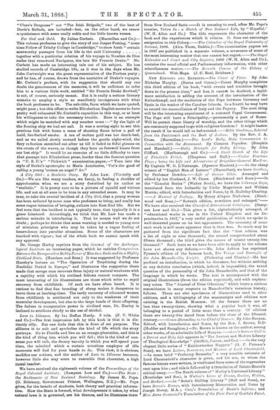noteworthy passages from his life in the said University together
with a particular relation of his voyage to Nombre de Dios under that renowned Navigator, the late Sir Francis Drake." Mr. Corbett has made an interesting tale out of his subject. He has studied records of Cambridge life, as it was in the days when Mr. John Cartwright was the great representative of the Puritan party ; and he has, of course, drawn from the narrative of Drake's voyages. Mr. Corbett's preface, with its suggestion that should any one doubt the genuineness of the memoirs, it will be sufficient to refer him to a carious little work, entitled "Sir Francis Drake Revived," is not, of course, seriously meant. But it is really a serious literary mistake to employ a style so manifestly incongruous with what the book professes to be. The sub-title, from which we have quoted, might pass ; but this effort to write Elizabethan English seems to have pretty well exhausted Mr. Corbett's capacities in this way, or at least his willingness to take the necessary trouble. Here is an example which might be matched with any number more :—" By the light of the flaming ship we had set sail. It was a moving sight to see this -precious link with home a mass of shooting flame below a pall of lurid, fire-flecked smoke. A sea of molten gold was her death-bed, and as we sailed slowly onward before the gentle night-wind, the fiery reflection stretched out after us till it faded to fitful gleams on the crests of the waves, as though they bore us farewell kisses from our lost ship." It would be an exercise of no little difficulty to turn that passage into Elizabethan prose, harder than the famous question in"C. S. C.'s " "Pickwick" examination-paper,—" Turn into the style of Burke's apostrophe to Marie Antoinette, Vot's the good of calling a young 'ooman an angel ?' &c."


































 Previous page
Previous page